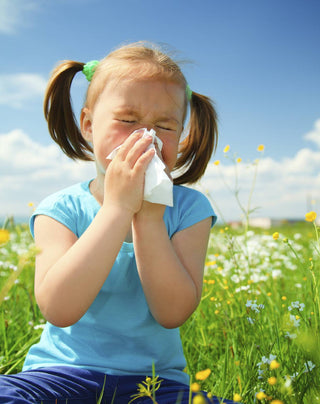Dogs have long been considered “man’s best friend.” Sure, we love them, but who doesn’t get annoyed when they track in dirt and dust from the outside?
Well as it turns out, we should actually be thanking them, because by doing so, our canine companions can actually help prevent allergy and asthma symptoms in our kids.
The latest study published in the journal Proceedings of the National Academy of Sciences suggests that exposure to pets in early childhood may lead to changes in gut bacteria that help prevent asthma and allergies.
Researchers collected dust from a pet-free household and from a house with a dog with indoor/outdoor access. The dust was mixed with water and fed to young mice. The mice were then exposed to ground-up cockroaches or egg protein, two allergens common to rodents and humans.
The mice fed dust from the “dog house” resisted the immune system challenges with little to no allergic reaction, but the other mice developed symptoms similar to allergic reactions in humans, like mucin secretion and increased immune activity in airways.
“Exposure to pets in early childhood may lead to changes in gut bacteria that help prevent asthma and allergies.”
Analysis showed that mice exposed to dog dust had fewer allergy-related immune cells, and those that were found produced fewer immune system molecules that typically cause a strong reaction.
The bacteria in the mice’s gastrointestinal (GI) tract were examined both before and after exposure to the dog dust. Mice fed the dog dust had significantly greater numbers of a bacterium called Lactobacillus johnsonii. When mice were fed that same bacterium without exposure to dog dust, they, too, demonstrated a diminished allergic reaction; they also showed reduced the airway inflammation when infected with a virus linked to the development of asthma. In addition, the positive effects were linked to lowered numbers of asthma-associated immune cells.
Boost Your Immune System This Cold & Flu Season with Probiotic-8
Lead researcher Susan Lynch, a microbiologist at the University of California, San Francisco, stated, “Our studies suggest that L. johnsonii> is a critical mediator of airway protection against environmental insults.”
While it is possible that dog dust may transfer extra L. johnsonii into the body, Lynch believes that bacteria from the environment are carried into the house by the dogs and are swallowed, producing a change in the GI tract that makes conditions more favorable to the L. johnsonii already in the gut.
And though the level of defense offered by L. johnsonii was still lower than that from the full array of microbes found in dog dust, the findings support the prospect that other bacteria might be employed to deliver full protection.
Lynch said her research, as well as other recent studies, persuaded her that “the composition and function of the gut microbiome strongly influence immune reactions and present a novel avenue for development of therapeutics for both allergic asthma and a range of other diseases.” They also point to changes in the gut microbiome having wide-reaching effects beyond the digestive tract, she added.
The Bottom Line
We love our pets for reasons beyond loyalty and companionship, and this is just one more reason that tips the scales in favor of having a furry friend in the home.
The new work adds another piece of evidence to the long-debated hygiene hypothesis, which holds that a modern, cleaner lifestyle may make us more susceptible to allergies, asthma, and autoimmune disorders; by preventing exposure to allergens, bugs, viruses, and parasites, the immune system is unable to set up proper immunity.
It also, perhaps, helps to explain why more children these days develop asthma or allergies. There have been many studies that show exposure to pets and/or livestock reduces the occurrence of allergic disorders, and this research gets us one step closer in understanding how and why this protective effect occurs.
The silver lining? It seems promising that manipulating probiotic gut bacteria such as L. Johnsonii could help treat or protect children from allergies and asthma in the future.
Whether you or your kids have allergies or asthma, it’s important to be aware of the foods that can trigger an allergic response. More than 120 foods have been identified as causing allergic reactions, but be particularly careful about these most-common food allergies:
- Eggs
- Fish
- Dairy
- Tree nuts (i.e. almonds, walnuts, hazelnuts, and Brazil nuts)
- Peanuts
- Shellfish (i.e. shrimps, mussels, crab, lobster, crawfish)
- Soy
- Wheat or gluten
And for more information on food allergies, check out the Mayo Clinic’s profile of this condition.
While you probably shouldn’t run out and get a pet just to protect your child from allergies or asthma, if you do happen to have one, you may want to give him or her a little treat as a thank you for helping to protect your child’s health!

